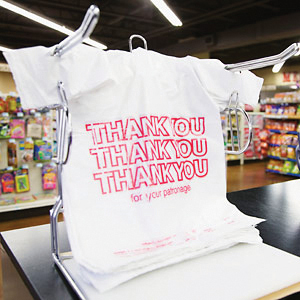By Peter Schurmann and Summer Chiang
New America Media
 SAN FRANCISCO — San Mateo resident Dan Lin Shen says he often comes to San Francisco’s Chinatown to purchase fresh produce. But if a proposed piece of legislation that seeks to impose a tax on the use of plastic shopping bags goes forward, the 63-year-old says he may consider shopping in other cities.
SAN FRANCISCO — San Mateo resident Dan Lin Shen says he often comes to San Francisco’s Chinatown to purchase fresh produce. But if a proposed piece of legislation that seeks to impose a tax on the use of plastic shopping bags goes forward, the 63-year-old says he may consider shopping in other cities.
“I understand that plastic bags damage the environment,” says Shen. “But the bag charge just isn’t practical.”
Instead, he says the government should be focusing its efforts on educating the community about strategies for recycling and reuse.
David Lee agrees. A political science professor at San Francisco State University and head of a nonprofit that works to increase civic engagement among Chinese Americans, Lee says the proposed legislation came in under the radar just days prior to the Thanksgiving holiday.
“It’s going to have a huge impact on ethnic communities,” says Lee, adding that little to no outreach was done to inform both consumers and retailers about the ordinance.
Put forward by outgoing District 5 Supervisor Ross Mirkarimi, who takes over as sheriff in January, the proposal goes before the Board of Supervisors next Tuesday. It calls for extending an existing 2007 ban on single-use plastic bags to all businesses in the city. Merchants would also be forced to charge a fee for compostable bags provided, whether plastic or paper, with the money going back to the business owner.
According to Lee, supporters say they have the votes necessary.
“It’s an uphill battle,” he admits.
David Lem with the Chinese Chamber of Commerce says he agrees with the proposal “in principle,” but, like Lee, notes that not enough was done to inform city retailers, particularly those frequented by the immigrant community.
“It’s got to be a whole community approach,” says Lem, adding that none of the proposal’s backers have reached out to his organization. Smaller, minority-owned establishments, he warns, won’t have time to implement the new requirements should they become law. “We have to figure a system out,” he says.
Jack Macy, commercial zero waste coordinator with the city’s Department of the Environment, says the ban is “really a reusable bag ordinance,” meant to phase out single-use plastic bags, which clutter city streets, clog storm drains, and wind up in the city’s landfills.
“There are costs to the city to pick up the litter and costs to handle the [plastic bags] in the waste management system,” Macy notes, adding that it also has an environmental impact in the energy and water required to produce plastic bags.
He says the city reduced its plastic bag litter by 18 percent since it enacted the 2007 ban, but “[the bags] are still a problem.”
If approved, the ban would take effect for small retailers next year and restaurants in 2013. Customers could start seeing bag charges of 10 cents starting in 2013, going up to a quarter per bag in 2014, the highest in the nation.
Macy says reusable bags cost more than single-use plastic bags, but the higher cost can be offset by the fee charged to customers for the bags.
According to a report by the city controller, that fee will cost consumers upwards of $14 million annually by 2014, with all the funds going back into the businesses and not, as Lee notes, to the Department of the Environment.
Despite the promise of returns, a number of small business owners in Chinatown said they hadn’t heard of the ordinance. Those that had, including Judy Du, senior manager at Old Shanghai souvenir shop, expressed concern that the ordinance “could offend long-time customers” who may feel reluctant to pay the bag charge.
Du also questioned how the city planned to enforce the law, which imposes a $500 fine on businesses that fail to comply.
Macy notes, however, that as with the city’s Styrofoam ban and its mandatory recycling and composting law, the goal is not enforcement through fines, but to build awareness of and promote alternative behaviors.
That may be easier to do for younger Chinese Americans, who say the bag fee won’t pose a problem.
Janice Zhao, 22, already prepares her own shopping bags, and says she is willing to pay a small fee if she forgets to do so. A supporter of the proposal, Zhao predicts it will “help discourage people in the community from using plastic bags.”
Wen Li, 31, arrived from Hong Kong seven years ago. She points out that a number of countries in Asia, including Hong Kong, already impose a fee for single-use bags. “Everyone has a responsibility to maintain the environment,” she says.
But for older immigrants, the proposal could prove more of a challenge. Lee notes that a number of the community’s more senior members don’t speak English and therefore have fewer alternatives as far as where to shop. Many also do not have cars, and may not always come prepared with enough of their own bags to carry away their groceries.
“You have to consider the low-income elderly shopper,” insists Lee, noting that they account for a large number of Chinatown residents.
Shoppers like Biji Lee, 68, who says she visits Chinatown’s produce stores nearly every day and fears that over time, the 25 cent fee will begin to add up. If passed, she says she will prepare her own bags to avoid the charge, but admits she’s frustrated.
“If I don’t come with my own bags, I’ll have no choice but to pay the fee. I don’t have the option of shopping outside the city.” (end)



